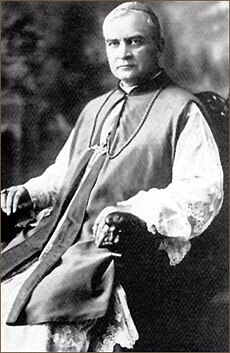Jurgis Matulaitis-Matulevičius
| Blessed Jurgis Matulaitis Matulevičius |
|
|---|---|
 |
|
| Bishop of Vilnius | |
| Born | 13 April 1871 Lūginė, Lithuania |
| Died | January 27, 1927 (aged 55) Kaunas, Lithuania |
| Venerated in | Roman Catholic Church |
| Beatified | 28 June 1987 by John Paul II |
| Feast | 27 January |
Jurgis [George] Matulaitis (Polish: Jerzy Matulewicz; 13 April 1871 in the village of Lūginė, near Marijampolė, Lithuania, Russian Empire – 27 January 1927 in Kaunas, Lithuania) was a Roman Catholic Bishop of Vilnius from 1918 to 1925 and founder of the Sisters of the Immaculate Conception of the Blessed Virgin Mary. On 28 June 1987, Pope John Paul II beatified him as the Blessed Jurgis Matulaitis-Matulewicz.
Matulaitis was the son of poor farmers and baptized at the monastery church of the Marian Order in Marijampolė. He learned his Catholic faith in catechism class at the monastery, from the Marian priest, Jurgis Cešnas. He was orphaned at an early age—his father dying in 1874, and his mother in 1881. In his youth, Matulaitis developed a weakness in his right arm and leg, that prevented him from working with his brother on the farm, and kept him away from classes at the school. His illness was years later diagnosed as tuberculosis of the bone, which he suffered with for the rest of his life.
Much time spent alone, led Matulaitis to develop his keen intellect. When his uncle, a priest in Warsaw, Poland, saw his potential, he offered to pay for his high school education at a minor seminary. And when civil authorities closed the Warsaw seminary, Matulaitis moved to the only remaining seminary in the Russian Empire, the Saint Petersburg Roman Catholic Theological Academy. Ordained to the priesthood on 20 November 1898, his high academic marks led his bishop to send him to the University of Fribourg, in Switzerland, for doctoral work.
Outside the watchful eye of the Russian civil authorities, Fribourg became a place for free discussion of the sad state of the Lithuanian homeland. With other students from Lithuania, Matulaitis talked about a Catholic cultural revival. Becoming convinced that religious Orders were best suited to the work of such a revival, Matulaitis traveled home, to Marijampolė, to discuss with one of the last remaining members of the suppressed Marian Order the possibility of secretly resurrecting the group. Trips to Rome and Marijampolė set the plan, approved by the Marian Superior Vincent Senkus, in motion.
...
Wikipedia
